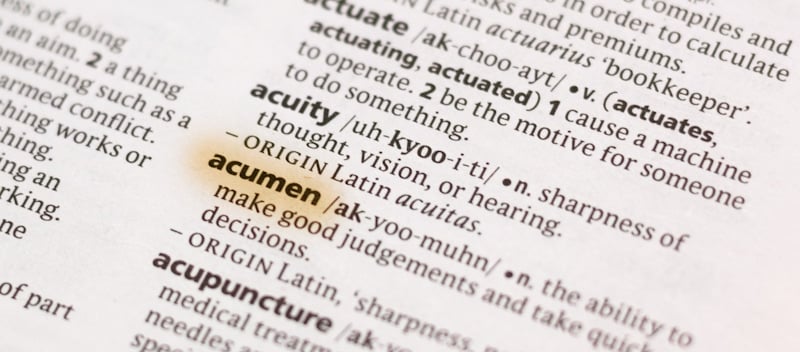Nobody is a born genius. Even child prodigies do not excel or are guaranteed success if they don’t work on their skills or try to get better at what they do well. In other words, developing “acumen” is critical to be good at anything perenially.
The term “acumen” denotes “shrewdness” or “keen insight”. It’s the ability to read between the lines, look at things from another perspective, make correct decisions at the right time, etc. Use “acumen” in your texts to represent the above traits. The term denotes “intelligence” and even more.
Using the word “acumen” in your texts should not be that difficult if you know the proper meaning of the term, the nuances there are in its definition and similarities to other words, the various contexts in which the term is typically used, etc. Keep reading to learn all of that and more.
 “Acumen” – Meaning
“Acumen” – Meaning
The noun “acumen” means “the ability to discern”. The word implies “characteristic penetration merged with strong pragmatic reasoning”. It denotes one’s “depth of perception” or “in-depth understanding of something”. “Acumen” is a relatively deep term and could be interpreted in different ways.
If an individual has “acumen”, they supposedly have the power to see things that are not apparent to the average person. They can make good decisions, thanks to their ability to think clearly.
The most successful people in the world – irrespective of the domain or industry – have excellent “acumen”. The following are most likely their attributes:
- Ability to make prompt decisions.
- Having a sharp intellect.
- Being able to make solid strategic moves.
- Being successful in their respective field.
The plastic surgeon with great reviews and a stupendous track record is likely to have the acumen needed to excel at their craft. Similarly, if you’re on the lookout for an accountant to take care of your company’s books, you would look for someone who has “financial/accounting acumen”.
The Origin of the Term
The term “acumen” has its roots in a Latin term. It’s a direct import from the ancient language, without any modifications before foraying into the English language.
The Latin “acumen” meant “point”. The ancient term was inspired by “acuere”, meaning “to sharpen”. “Acuere” too isn’t entirely original. It was derived from another Latin word, “acus”, which meant “needle”.
When “acumen” was first used in English during the 1500s, it denoted “sharpness of wit”. However, in contemporary English, it refers to “an individual’s strong perception to quickly and cleverly grasp a situation to their benefit”.
“Acumen” – Related Terms and Antonyms
Words that are similar or close to “acumen” in meaning include “astuteness”, “intelligence”, “knowingness”, shrewdness”, “sharpness”, and “clear-sightedness”. Words such as “discernment”, “insight”, “perception”, “wisdom”, “sapience”, etc., are not necessarily synonyms but words related to “acumen”.
While most of the above synonyms denote “the power to view things that aren’t apparent”, “acumen” adds to that by implying “the ability to penetrate and get to the root of things, coupled with practical judgment”.
The term could also have a slightly negative tone, based on which side of the table you are on. If a person’s acumen is working against you or your interests, you are inclined to describe that shrewdness as “deviousness”, “craftiness”, “slyness”, “sneakiness”, etc.
The opposites of “acumen” include “artlessness”, “innocence”, “ingenuousness”, “guilelessness”, “naiveness”, and “unworldliness”.
Business and “Acumen”
“Acumen” essentially denotes “the skill or ability to make correct judgments and decisions in a given subject – for instance, politics or business”. And the term “business acumen” gets thrown around a lot. It’s so common a phrase that it even gets used in texts that aren’t discussing “trade and commerce” per se.
“Business acumen” means “business sense” or “business savviness”. It denotes keenness and swiftness in comprehending and managing a business scenario in a way that’d likely reap benefits or produce favorable outcomes. The term “business acumen” has also evolved to signify leadership development and financial performance.
According to industry experts, people who carry “business acumen” have an “executive mentality”. They understand financial metrics such as cash flow, profit margin, etc., and how all of those aspects impact a company’s stock price.
Kindly note, not all people with financial literacy have “business acumen”.
Besides understanding financial statements, individuals with business acumen:
- See the larger picture.
- Are good at decision-making (make timely decisions after considering all factors and variables) and aware of the impact their choices and actions can have on their firm.
- Communicate ideas to managers, executives, other employees, and the public effectively.
Acumen is related to the mind and could be genetically coded, too, to an extent. But it’s also something one develops through learning, experiences, practice, etc.
If you aspire to become a successful businessman or take your parents’ business to greater heights or at least sustain its profits, just being their offspring won’t suffice. You should put in a considerable amount of effort and time into learning the trade from within and outside.
For instance, if you don’t have the “acumen” needed to run a restaurant, even a million dollars of capital funds will not turn you into a great restaurateur. People with the correct business understanding, on the other hand, can make an empire out of almost nothing.
Most importantly, do not confuse “business acumen” with “luck”. But if you have the needed acumen, lady luck will knock at your doors more often than not.
Using the Word “Acumen” in Texts
The term “acumen” is a noun that gets used in a variety of texts or contexts. Here are a few example sentences demonstrating that:
- I respect his acumen, his business flair.
- His acumen is (partially) inherited – the money is not.
- The rural areas exhibited considerable entrepreneurial acumen.
- Documentary theater’s strength lies not just in acumen and political insight.
- Understanding the theory of delirium could improve diagnostic acumen.
- They believe the clinical acumen offers an intuitive look into the core of the patient’s overall condition.
- The text is lacking some critical acumen.
- She does that with acumen, erudition, and wit.
Often, the word is paired with an adjective to form a proper term – for instance, “financial acumen”, “business acumen”, “medical acumen”, “political acumen”, etc. The following are a few sentences constituting those terms:
- She had exhibited considerable business acumen.
- He possesses significant financial acumen.
- Her business acumen is the primary reason for her success.
- She lacked the political acumen and judgment to become the party president.
- Ms. Westwood hid her legal acumen behind those quirky outfits and eccentric hairdos.
- Her prosperity has its roots in business acumen.
- He combined political trimming with business acumen to help his company achieve its vision.
- Beyond her financial acumen, Mary knows more than a thing or two about pleasing political and business movers.
- The company’s success is primarily due to the country’s commercial acumen.
- Her forceful personality concealed her poor political acumen and weak leadership.
- Mr. Gonsalves has natural business acumen.
- Contributions that combine philological acumen and theoretical interest are particularly welcome.
- She simply credits her business acumen for all success.
Example Sentences with the Term “Acumen”
The following is another list of sentences with the word “acumen”:
- Her steady shrewdness, historical acumen, and “not-so-common” common sense help her view problems from a completely different angle.
- His political acumen won him the election.
- Merging the two companies was a big mistake, and it shows he lacks business acumen.
- Her personal experiences and business acumen are a repository of invaluable industry knowledge.
- Martha’s business acumen and computer proficiency make her a significant asset to the company.
- While you’re pretty good at customer service, your financial acumen is not up there yet for us to consider you for the branch manager position.
- Political acumen is critical to sway people’s thoughts and win elections.
- He requires more than just acumen to work as a head sales executive at that company.
- Despite being a skilled chef with tons of kitchen experience behind him, he couldn’t successfully run the restaurant as he lacked the necessary restaurant business acumen.
- Lawyers with acumen are valued highly at any law company.
- Thanks to her business acumen, she could tell the market was getting oversaturated and that their company needed to diversify.
- The point is not her acumen, but she treats her clients as commodities and not as people with actual pain points.
- Thanks to the several key business acquisitions she realized, Mrs. Briggs has got a considerable appreciation for her acumen in recent years.
- The leader has zero experience in politics, and the lack of political acumen clearly shows during his interviews.
- He thinks the manager is a suspicious guy, although being able to discern that doesn’t require acumen.
- Answering that question would need a deep level of acumen and, at times, access to new investigative tools.
- We have all admired and looked up to her wisdom, management style, and assured leadership that merges business acumen with a touch of warmth.
Conclusion
When using the term “acumen” in your sentences, ensure the text intends to throw light on more than just the individual’s talent and experience. It should reflect the person’s shrewdness, the ability to envision or see things others usually do not see, etc.
If the word “acumen” in your texts can be replaced by terms such as “insightfulness”, “astuteness”, “shrewdness”, and other synonyms, the usage is correct. If it, however, is used in place of nouns such as “erudition”, “knowledgeable”, “sageness”, etc., it may not be the correct term for the text.
Shawn Manaher is the founder and CEO of The Content Authority. He’s one part content manager, one part writing ninja organizer, and two parts leader of top content creators. You don’t even want to know what he calls pancakes.



